
I am going to structure the newsletter a little differently this year. Instead of grouping the nuggets in categories of our relationship with God, maturing in our faith, and our relationship with others, I am not going to sort the nuggets.
Since we are –basically — looking at the whole Book of Revelation, I’ll keep the nuggets by devotion.
The Revelation of Prophecy
- The Book of Revelation is an account given to John by Jesus.
- Who better to tell the judgment of the world than the Head of the Church and the One Who will judge the world?

- Jesus’ job was – and had always been – to pass on the message.

- God gave us time to prepare so that our spiritual conditions may be right when Jesus comes again.
- God wants us to know Him as our loving Father. He also wants us to know Him as a wrathful God.
- Jesus gave the message to His angel to give to John.
The Reason for the Revelation
- The Book of Revelation was given by the angel to the Apostle John.
- He was the servant of the Servant of the Lord – the Messiah. John would have welcomed that title!
- John was to be an eyewitness to the revelation of God.
- This book that John wrote is a testimony to what he was shown. It is an eyewitness account of the visions given to him by God the Father.

- We are blessed when we heed the prophecy given.
- The blessing is based on three steps. We have to read, hear, and keep what is written in it (Rev. 1: 3 ESV). We have to be obedient. The blessing is conditional.

- We have to obey – not just keep but obey – God’s Word so that we can spend eternity with Him.
- John and Paul – and probably a lot of other people – thought Jesus’ return was going to happen any day. Even with John the only original Apostle still left, they would have completely missed the Jesus-the-religious-Savior focus of Jesus’ mission. They were so intent on Him being Jesus-the-military-savior.
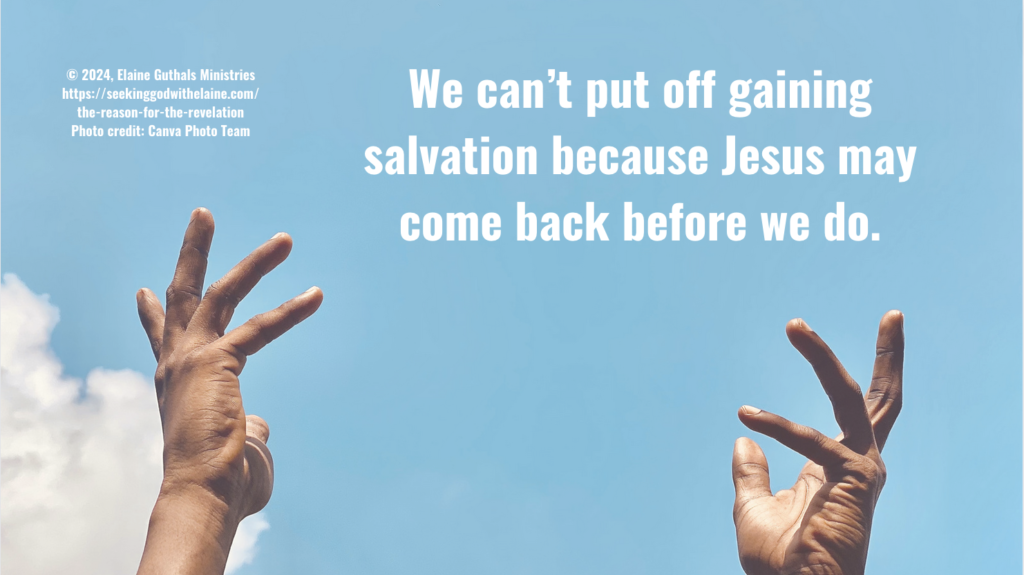
Greeting to the Seven Churches from God
- John identified seven specific congregations to whom he was writing. If we look in the Complete Jewish Bible, they are called Messianic communities in Asia (modern day Turkey). In the English Standard Version, the translation I normally use, they are called churches. That is what they would eventually come to be called, but they weren’t called that at the time John wrote the letters to them. They were more than synagogues.

- My take is John was writing to a limited number of churches in a very specific region of the known world of that time regarding issues at the identified Messianic congregation that still exists in the universal Church. He was talking to every Tom, Sally, and Elaine.
- John’s salutation was a combination of the Greek salutations with the Hebrew salutations.
- The greeting helps show us the purpose of the Book of Revelation. It shows us God’s grace in providing salvation to His disobedient creation. It also shows salvation brings peace, which will be ours for eternity.
- John’s greeting also represents the Trinity as he did in Revelation 1: 1, but this time he goes farther into acknowledging the Trinity (without, again, acknowledging it).
- The Holy Spirit is always before God, waiting to do His bidding.
- We can’t focus only on what the Holy Spirit does for us. We have to realize His primary mission. He is to share His praises with all who will listen. He is there to do the bidding of the Heavenly Father.

Greetings to the Seven Churches from Jesus
- If Jesus had been an imposter, He was damning them to being guilty of idolatry.
- What Jesus was asking for is our faith and confidence, showing He was the Son of God.
- Jesus delivers certainty that the gospel message provides the truth.
- Jesus always stated that He constantly followed God’s directions.
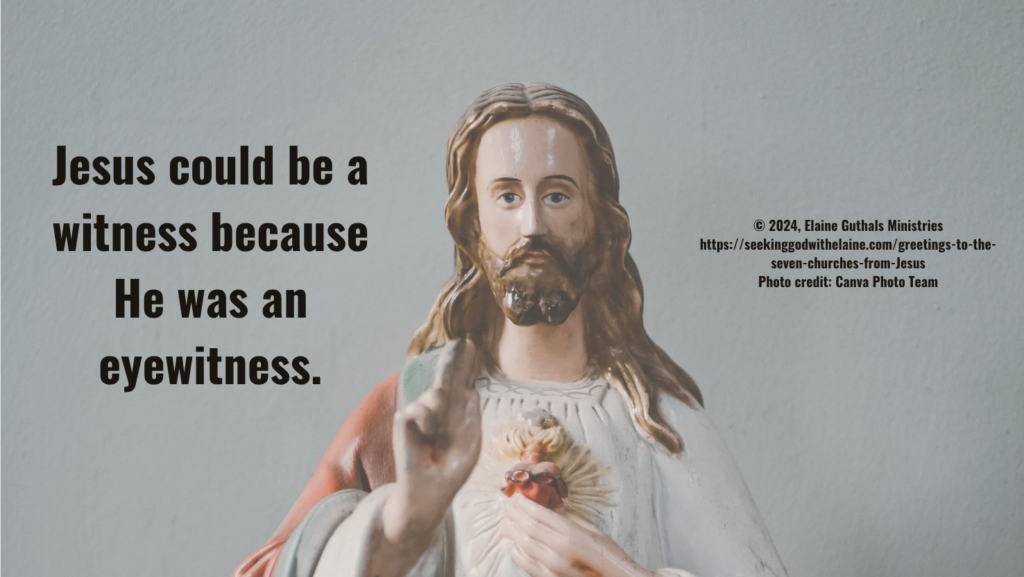
- The accomplishment of the Plan of Salvation could only be given to Jesus.
- Jesus proves that the gospel message provides the life because of His resurrection.
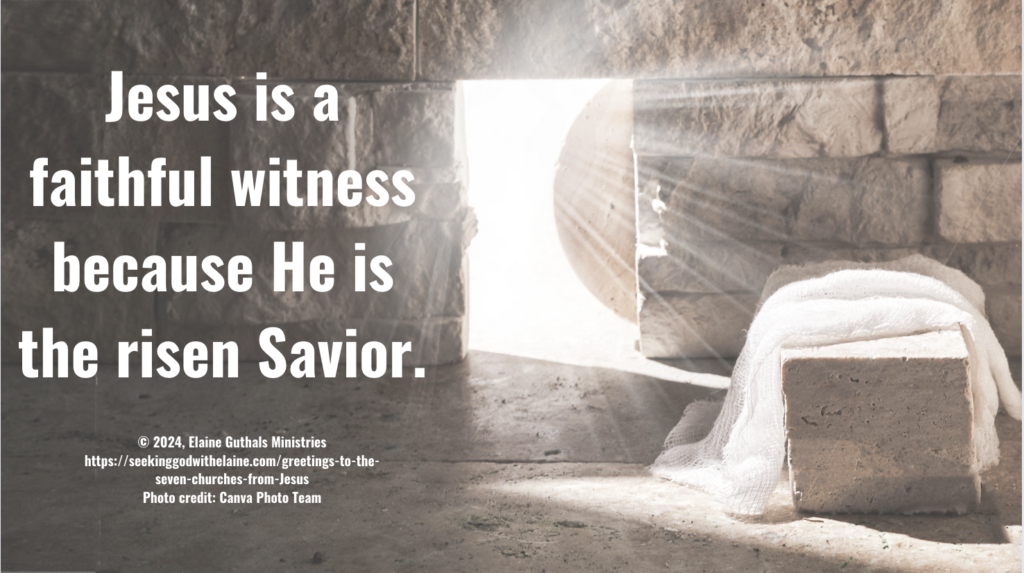
- Jesus proves that God’s Kingdom is real and that He has authority.
- Jesus’ reward for successfully accomplishing the Plan of Salvation was authority.
- The kingdom of God is over our heart and our spirit. We submit our conscience to Him.
- John broke out in a prayer of praise celebrating His Savior.
- This is how we should worship Jesus in this life, because this is how we are going to worship Jesus for eternity.
- It is only through Jesus’ death on the cross that we are washed from our sins.
- The weight of sin can be heavy, crushing us under the heavy burden. Sin has also been described as slavery.
- John acknowledged that we are kings and priests in God’s kingdom.
- Our character is of a kingly nature since we are made in God’s image.
- We are also God’s priests because we are one with Christ. As priests, we are also called to teach others.
- John concluded this section with a doxology of praise.
- There is no way we could repay Jesus for what He did on the cross for us. Good thing He doesn’t want us to try.
God’s Love Chooses Us
- Election is all about God choosing the mankind.
- Sovereign God has elected us. No one forced God into it. He exercised His free will and totally chose us.
- God chose us before the world was created. Before anything was even made, He knew we would disobey Him.

- Notice the words that aren’t mentioned in Ephesians 1: 4-5? Repentance isn’t there. We don’t have to clean ourselves up before we can approach God. But then, neither is faith mentioned. It isn’t about what we do or don’t do. It isn’t about having a mustard seed faith or a redwood faith. This is where grace comes in.
- Disciples are preordained to become the image of Jesus.
- Many think that predestination means that we are given salvation without choosing it and without repenting. I don’t think so.
- Some – and they would be wrong – could read Romans 8: 29 to mean there are some God foreknew and predestined and some He did not choose.
- God foreknew everyone. He is the One Who created them.

- Salvation is based on a change of heart. We have to change from our sinful selves to imitating God. That change can only come from God Himself.
- I think the predestination part is to what we are changed. It is predestined that we are to become like Jesus is.
- When we say we become as God is, we are saying that we inherit His divine nature. God has predestined us to be sanctified.
- Disciples are preordained to become members of God’s family.
- Our character is changed along with our name. God provides the Holy Spirit to instruct and guide us.

- God’s Will is that we be regenerated and sanctified until we are perfected.
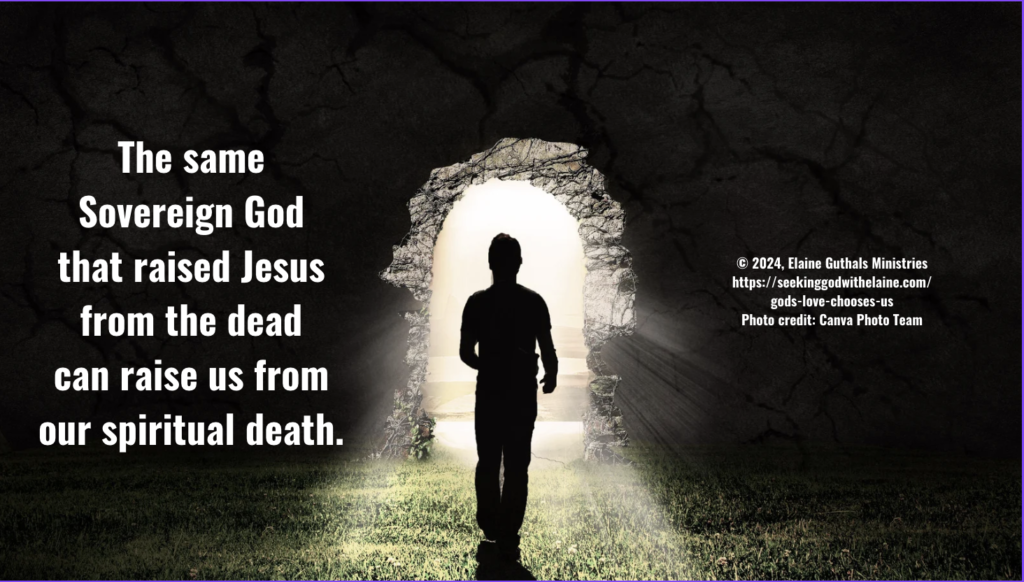
- We are taking off our sinful nature and putting on holiness. You know, out with the old creation, in with the new (II Cor. 5: 17).
- Everything God does is for His glory. It is because of His goodness that He passes His blessings onto us. It is only when we find happiness in Him that we obtain those blessings.
A Free and Unmerited Love
- When we were made in God’s image, we were not sinful. Because death had not been introduced, we were not mortal. So, why did God give us free will to screw that up?

- God would rather reward obedience gained through freedom than be a dictator and receive forced, false worship.
- We think mankind has to be of some consequence, or God would not be mindful of us. Instead, God is magnified in our weakness.
- God love us regardless of our flaws.
- Gods chose us because of His love and grace. He showed us this through the Plan of Salvation — His plan of redemption for us.
- We have to realize that, to God, religion is all about not only restoring our relationship with Him but also strengthening it.
- God made us in His image so that we can and will worship Him. We depend on God for everything — for life.
- We are wonderfully made because we are made in God’s image.
- God made us intellectual beings. Still, we are not as smart as God.
- We are who and what we are because we are made in God’s image. We have — to a lesser extent — most of the attributes of God.
- It is the job of the Holy Spirit to help us understand what it means to be a spiritual being. He shows us what a perfect disciple looks like.
- All mankind is going to live for eternity. Disciples will do so in Heaven. Non-believers will do so in hell. We are immortal just as God is.
- We are responsible for our actions. We will be held accountable for our choices.
God’s Love through the Mystery Plan
- God adopts people who ABCD into His family.
- After we have given our hearts and lives to Jesus, we become saints. It is a designation to separate us from those in the world.
- God loves us so much that, when He calls us to do something, He doesn’t just throw us out there. He will equip us with all that we need to accomplish His purpose.
- We are called to be ministers for Christ.
- God needs to have an element of the unsearchable. He needs to be more than we can understand so we don’t think we have figured Him out — and therefore, put us on equal footing with Him.

- The Plan of Salvation is finished but not totally completed.
- When we look at the Old Testament, Jesus’ name is never mentioned even once. However, Jesus is throughout the Old Testament. It was kind of like He was hiding in plain sight.
- God didn’t want us making our decision to follow Him based on our intellect. God wants us to take it on faith.

- The local congregations are formed so that believers have a place to go to learn and be supported as we navigate the Sanctification Road.
- It was always in the plan to create the Church – a body of believers with Jesus as the Head.
- It was always God’s plan to reveal Himself to mankind. By redeeming us, God could show us that He is perfect.
- God can only reveal them to us as we become more like Him. That is where sanctification comes into play.
- The angels don’t need the Plan of Salvation. They remain faithful to God. Satan and his demons won’t be offered salvation. They made their choice; now, they have to live with it.
- Think of how much angels are learning by witnessing God’s interaction with us. They are seeing His love and forgiveness played out daily.
- God’s priority is our spiritual condition, not our physical life in this world. He provides what we need to prepare us for who we will be.
An Everlasting Love
- Jesus has an everlasting love for us that has no beginning, lasts for eternity, and remains faithful regardless of our actions.
- We can’t talk about Jesus’ love for us without talking about God’s love for us. They worked in tandem on the Plan of Salvation. Where One designed the Plan, the Other implemented it.
- This love is personal. God calls each and every one of us to salvation. We gain salvation by personally accepting Jesus as our Savior and God as Sovereign Lord.
- We know Their love for us is everlasting because they are eternal.
- What John told his audience in John 13: 12 is that, even though they never met Jesus personally, He loved them just as much as He loved John.
- Jesus not only tells us in words He loves us. His actions also backed them up.

- God does love us regardless of our actions, but He does require us to accept the Plan of Salvation to gain eternal life.
- Jesus has an everlasting love for us that never changes as He leads us through trials.
- Our faith grows in two ways through these trials. We endure trials that bring us to a deeper understanding of the life of which He offers us. That understanding grows our confidence in God. We see Him for Who He is – One Who’s love never changes.
- Jesus has a compassionate love so that He will never leave us even when He turns away.

- God isn’t giving up His authority over us. But He is exercising justice over us when He turns away in wrath. God is still there. We just don’t have access to Him.
- It isn’t God just turning away from us. We drive Him away because of our sin. It is because of our moral deterioration that God must limit access.
- Because of His steadfast love for us, God has compassion on us. He is faithful to us — even when we are not faithful to Him. That is because His everlasting love isn’t contingent on our actions.
An Unsolicited Love
- We can know God by His love.
- God loved us before we were created. Nothing in this world could match it.

- Do we really want a love that can be determined solely through logic?There is so much about God that is hard for us to understand.
- When we think of God as love, we can understand. It takes it out of our imagination and consciousness and puts it into us.
- If God was only benevolent — well-meaning and kind — would we really understand the reason for Him sending His Son to die? That Sacrifice would seem over the top.
- Some might ask if it is really love for God to create us only to banish us because we disobeyed Him. Doesn’t that show true love?
- We have to remember that all the trials we suffer in this world are growing us to be more like God. It is training us for the world that is described in the Book of Revelation.
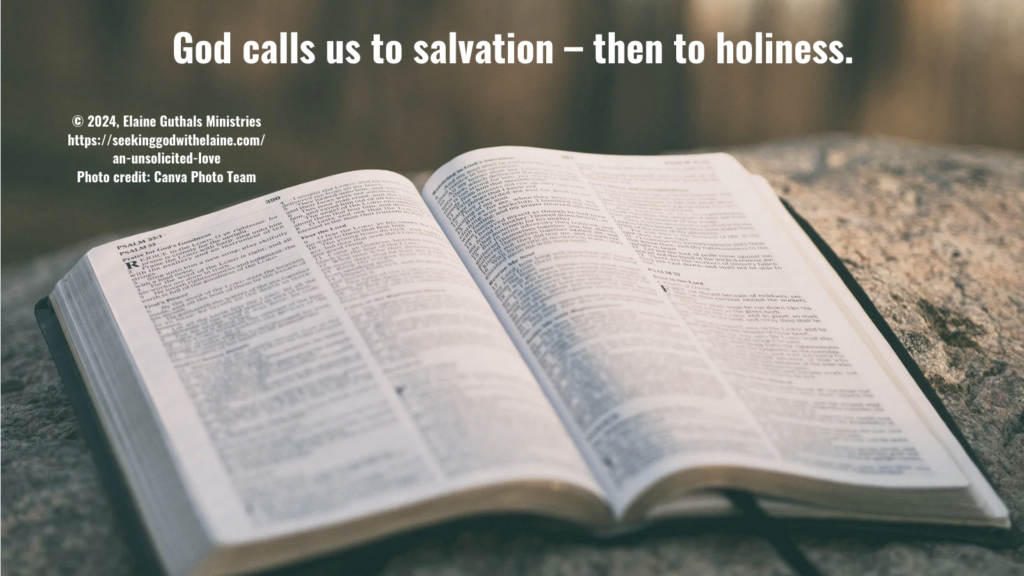
- Even if we are unaware that God loves us, He does. He loves non-believers as well as believers.
- God’s love is not like our love. Our love is a feeling or emotion that we have. God’s love is an elemental part of His being.
- God expresses His love through His actions toward us.
- While God’s love is everlasting, it is shown through things that are not. It is shown through circumstances, some which may last only a short amount of time.
- No, God didn’t give the laws and commandments to Moses so everyone could fail. He gave them so we could see that we need a Savior.

- We have to choose to accept God as our Heavenly Father. We have to choose to love and obey Him by following His laws and commandments.
- Since God’s love is for all, His salvation is for all.
- If love wasn’t the foundation, would we be able to believe it? I don’t think so. Salvation isn’t salvation without love.
A Forgiving Love
- God loves us enough to forgive us of our sins.
- God is Sovereign God. He could have presented Himself to us as a tyrant, a dictator. He could show us His power and His majesty. Instead, God shows us His sympathetic side. He wants us to be a family, so He shows Himself as our Heavenly Father.
- Only God’s love is the source of our redemption. It is only through faith that we accept God’s love.
- It is through faith that we have a relationship with God. He is our Father, and we are His children.
- We have to open ourselves up to God’s power and love. Even though we don’t fully understand something, we have to trust God that His way leads to truth.
- We can’t test our knowledge by worldly standards. We have to employ criteria that leads us to holy outcomes, not just intellectual knowledge.

- We hear God by reading and listening to His Word.
- We aren’t reading God’s Word to find knowledge. We are reading it to find God.
- We want to be holy. Holiness is a product of love. In fact, “Anyone who does not love does not know God …” (I Jn. 4: 8 ESV).
- God loved us while we were not reconciled to Him.
- God’s Word is abundantly clear that God hates sin.

- Sinners are enemies of God. Sin has taken us that far down.
- Restoration takes the inner spiritual chaos caused by sin and makes us a new creation.
A Unique Love
- God’s love is unconditional.
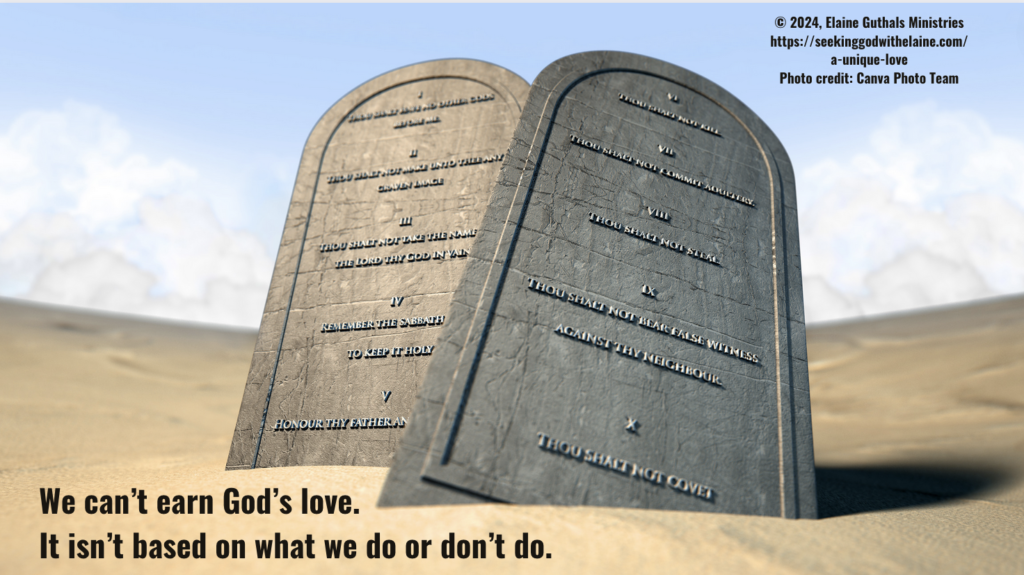
- God’s love for us is sacrificial. It is the crux of His Plan of Salvation. It is the foundation of the gospel, the law, and the prophets.
- Once we see how great a love God and Jesus have for us, we should joyfully believe it is so.
- We have to realize that spiritual love is unique in that we are expected to embrace all the different things that encompasses. It is infinite, unchangeable, and everlasting.
- God’s love is meaningful.
- As disciples, we need to bear fruit. So many times, we just see that as witnessing, but that isn’t what Paul said. Yes, witnessing is a part of sanctification. It isn’t a part of salvation. We are to work out our salvation to become more like God.
- Jesus’ love is unselfish and unstinting.
- Our redemption was Jesus’ priority. He had an unselfish love for us

- There was nothing we could do to restore our relationship with God – except accept His love. Jesus loved us even though He would never receive anything from us. It is in that love which we are supposed to walk.
- The intensity of Jesus’ love is immense. It is unmatched.
- Jesus’ love is functional.

- Our love has to be built on our relationship with Christ. It has to be vital. It has to be applied.
- Our love with Jesus has to grow us and branch out to our relationship with others.
- Jesus’ love in us has to be shown in our consideration of the needs of others.
- We must abide in love. This is our duty. Because we remain in God, we are blessed.
- If we are not going to obey His commandments, how can we say that we love God?
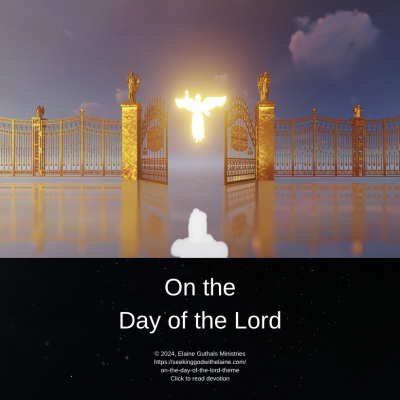
To read devotions in the On the Day of the Lord theme, click the button below.
Devotions in the Getting Started in Revelation study
Related Links
We the People